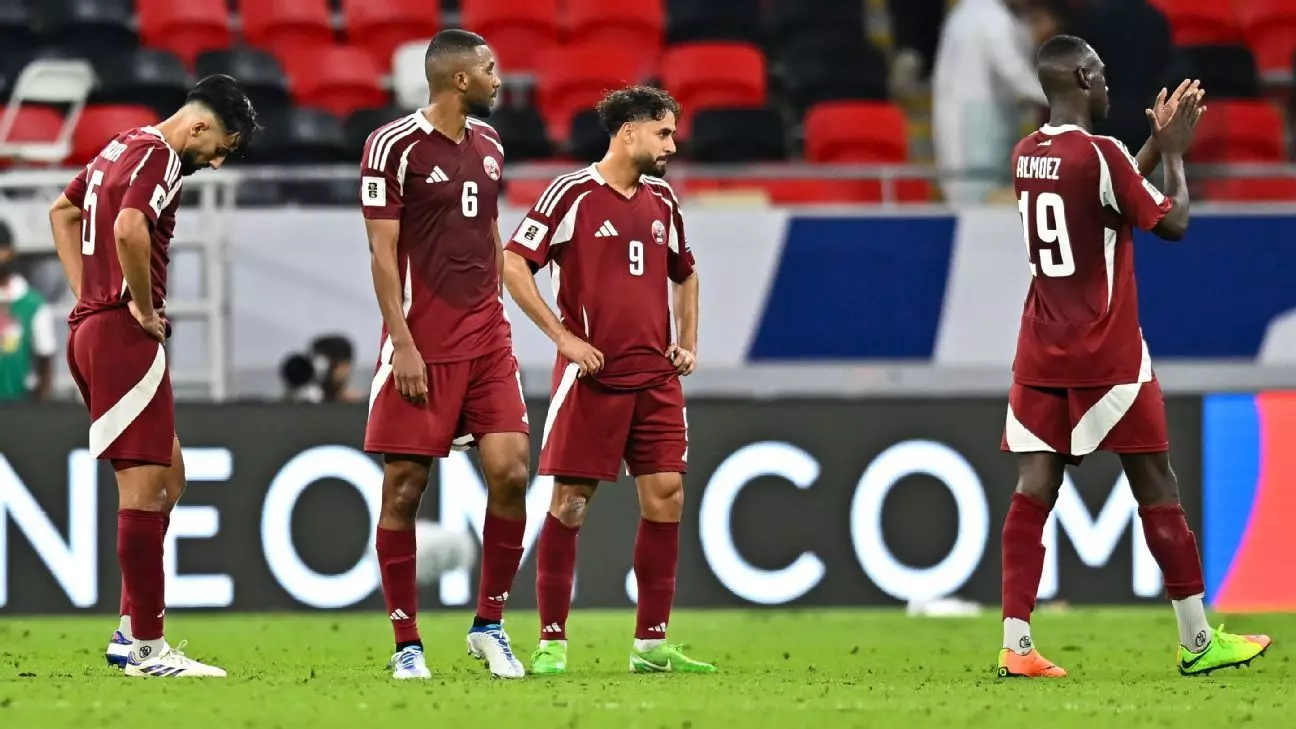Qatar entered the international football arena with heightened aspirations following their World Cup debut as hosts in 2022. With the upcoming 2026 World Cup set to expand to 48 teams, and the Asian Football Confederation (AFC) offering eight guaranteed spots, hopes were undeniably high for Qatar to return on merit. This anticipation was amplified by their consecutive AFC Asian Cup victories in 2019 and 2023, solidifying their position as the champions of the continent. However, as they navigate the ongoing qualification rounds, the reality is grim; currently sitting fourth in their Asian qualifying group, a deeper analysis reveals a troubling narrative that complicates their pursuit.
The current standing of Qatar in Group A speaks volumes but also raises questions. Despite the expectations riding on their shoulders, they have only managed to secure two wins from their six matches. With a total of seven points, they trail by three points behind third-placed UAE and six points from Uzbekistan, the second automatic qualifying position. Shockingly, their defensive record stands as the worst among the 18 teams in the qualification round, having conceded 17 goals — surpassing even teams with dismal performances such as China, who recently faced a staggering 7-0 defeat against Japan.
The most recent humiliation, a 5-0 loss to UAE, left fans and analysts alike stunned. The game marked a critical juncture, with Qatar conceding three goals by halftime, largely unable to contain the rising star, Fábio Lima. Earlier in the campaign, a draw with North Korea—characterized by the fact that the latter played with ten men—added more woes to Qatar’s growing list of disappointments. These outcomes beckon the question: How did the reigning Asian champions fall so drastically in a matter of months?
As Qatar’s footballing project faces scrutiny, some might hastily assign blame to the coaching staff. However, the leadership transition seems to be one of the more significant hurdles. Head coach Tintín Márquez, who previously led the team to Asian Cup success, has struggled to find a consistent tactical approach. His frequent switches between formations—from 5-3-2 against Uzbekistan to a disjointed 4-3-3 against UAE—evince a struggle for identity. This indecision invites criticism, particularly as it hampers player performance. Stars like Akram Afif and Almoez Ali have fluctuated between positions, losing the rhythm that made them formidable assets.
Moreover, the gap left by the likes of Hassan Al-Haydos in the dressing room is proving to be an even more significant loss than his on-field contributions. Afif, now captain, carries immense talent but may not yet possess the vocal leadership necessary to galvanize the team through turbulent times. The generational shift within the squad—with veterans phasing out and a new crop of players emerging—presents the added challenge of building cohesive team dynamics in a competitive environment.
Addressing these struggles demands an assessment of Qatari football’s strategic direction. While there is undeniable talent among the younger players, such as 19-year-old Ibrahim Al-Hassan, their development must align with immediate performance needs. The emphasis on long-term growth cannot come at the expense of pressing current objectives. Qatar’s focus needs to shift toward stability in both coaching strategies and player roles, with an emphasis on nurturing leadership qualities in the younger players to smoothen the transition.
Furthermore, an examination of their tactical plays reveals a lack of cohesion. Instead of seeking quick fixes through international naturalization—often a criticized path taken by rivals like UAE—Qatar must aim for a robust team philosophy borne out of sustained training and tactical familiarity. Only by adopting a more transparent and coherent style of play can they hope to rekindle the spark that led to past successes.
As Qatar wrestles with these formidable challenges, their hopes for World Cup qualification remain precarious. They have four remaining matches to find their footing and secure at least a top-four finish, granting them a glimmer of hope moving into the next round of qualifiers. It is imperative for the players and coaching staff to coalesce into a unified force, allowing Qatar to ascend from their current predicament. With time running out, the nation must summon its competitive spirit and rebuild to reclaim its stature on the Asian football stage. Failure to do so could not only dash dreams of World Cup participation but also hinder the growth trajectory of Qatari football for years to come.

Leave a Reply